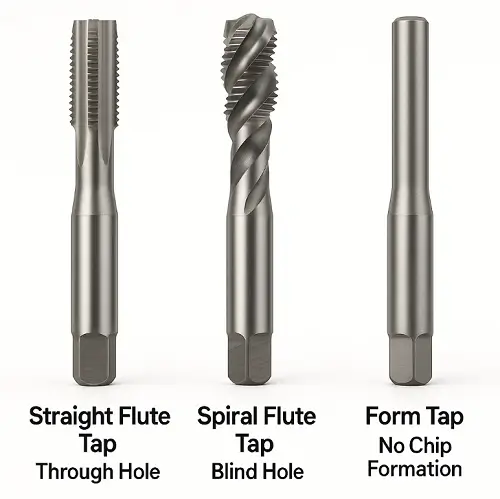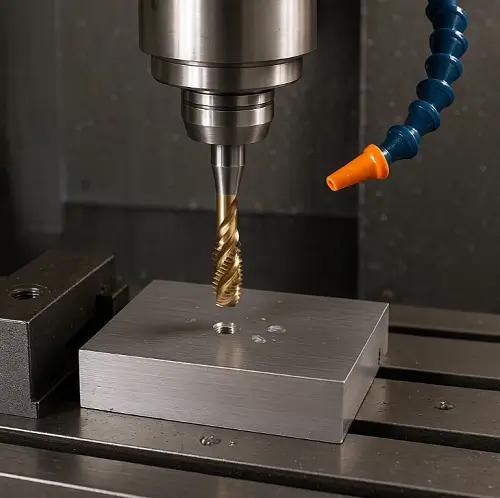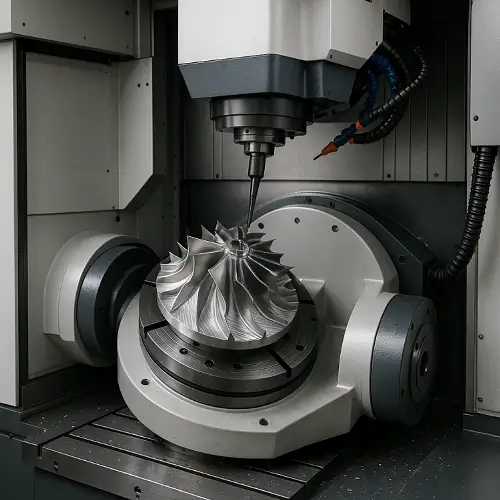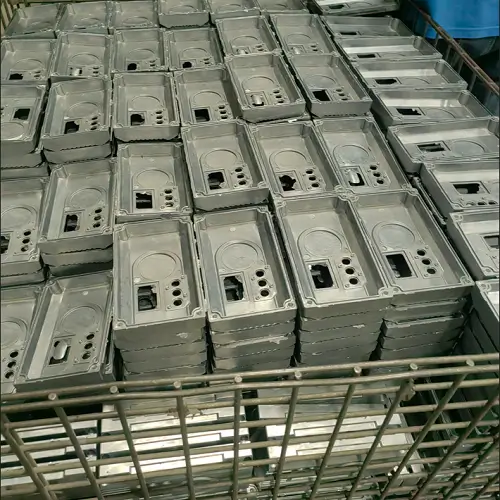Thread taps are indispensable in precision manufacturing, enabling the creation of accurate internal threads in a variety of materials. From cutting threads into stainless steel components for aerospace use to forming threads in aluminum housings for automotive assemblies, selecting the correct tap influences dimensional accuracy, surface quality, and service life. Today, thread taps are integral to CNC production lines, mold fabrication, oilfield equipment maintenance, and medical device manufacturing. A solid understanding of tap types, size standards, and correct usage ensures reliable results across industries and minimizes costly rework.JeekRapid provides CNC thread tapping services for applications ranging from aerospace and automotive to specialized industrial equipment.

What is a Thread Tap?
A thread tap is a precision tool that cuts or forms internal screw threads in a pre-drilled hole. Tapping can be done manually or by machine. Cutting taps remove material to form threads, while forming taps displace material without generating chips. Machine taps are built for consistent, automated operation in CNC machining centers, while hand taps are typically used for low-volume production, repair work, and prototyping.
Types of Thread Taps
Machine Taps
Designed for powered operations, machine taps include straight flute taps for through holes, spiral flute taps for blind holes, and thread forming taps for chip-free thread creation in ductile metals such as aluminum and brass. Spiral flute designs direct chips upward, helping to avoid clogging in deep or blind holes.
Hand Taps
Hand taps are often sold in sets containing taper, plug, and bottoming taps. The taper tap starts the threading process with gradual engagement, the plug tap deepens the thread, and the bottoming tap finishes it to full depth. These are widely used for maintenance work and in toolrooms without automated tapping equipment.
Specialty Taps
Special-purpose taps are available for unique threading needs. Examples include pipe thread taps (NPT) for sealing joints in fluid systems, acme thread taps for power screws, and extra-fine thread taps for optical and precision instruments. Coatings such as TiN or TiCN extend service life in abrasive or work-hardened materials.
Thread Tap Sizes and Drill Charts
Metric Thread Tap Sizes
| Tap Size | Pitch (mm) | Drill Size (mm) |
|---|---|---|
| M3 × 0.5 | 0.5 | 2.5 |
| M4 × 0.7 | 0.7 | 3.3 |
| M5 × 0.8 | 0.8 | 4.2 |
| M6 × 1.0 | 1.0 | 5.0 |
| M8 × 1.25 | 1.25 | 6.8 |
| M10 × 1.5 | 1.5 | 8.5 |
Imperial Thread Tap Sizes (UNC / UNF)
| Tap Size | Threads Per Inch | Drill Size (inch) |
|---|---|---|
| 1/4-20 UNC | 20 | #7 (0.201″) |
| 5/16-18 UNC | 18 | F (0.257″) |
| 3/8-16 UNC | 16 | 5/16″ |
| 1/4-28 UNF | 28 | #3 (0.213″) |
| 5/16-24 UNF | 24 | I (0.272″) |
A complete tap drill chart for both metric and imperial sizes prevents undersized or oversized holes, ensuring proper thread engagement and strength.
Best Taps for Different Materials
Stainless Steel
Use cobalt alloy spiral flute taps with TiCN coating for improved durability and reduced friction. Recommended cutting speed: 6–10 m/min.
Aluminum
Thread forming taps are ideal for producing clean, chip-free threads with smooth finishes. Recommended cutting speed: 30–50 m/min.
Brass
Standard straight flute taps deliver excellent performance without high-end coatings. Recommended cutting speed: 20–35 m/min.
Hardened Steel
Carbide taps or high-speed steel taps with AlTiN coating handle hardness without premature wear. Recommended cutting speed: 4–8 m/min.
Industry-Specific Applications
Automotive Manufacturing
Used for engine block threads, transmission housings, and chassis components. High-speed machine taps provide consistency in large-scale production.
Aerospace Engineering
Spiral flute taps are preferred for blind threads in titanium and high-strength aluminum alloys, combining strength with reduced weight.
Mold Making
Critical for mold inserts, ejector plates, and threaded cavities where precision ensures proper mold function.
Oilfield Equipment
Heavy-duty NPT taps are used in thick-walled pipes and tool joints for sealing threads in high-pressure systems.
Medical Devices
Miniature taps create threads in surgical instruments and implants, demanding exceptional precision and clean finishes.
Precision Instruments
Ultra-fine thread taps are required for microscopes, optical devices, and lab equipment, where minor errors can affect functionality.
For projects requiring complex threads or special materials, JeekRapid offers custom thread tapping solutions tailored to exact specifications.
Common Problems and Solutions in Thread Tapping
Tap Breakage
Often linked to undersized pilot holes, poor alignment, or chip accumulation. Select the correct drill size, use spiral flute taps for blind holes, and apply adequate lubrication. For hard materials, opt for cobalt or coated taps at lower cutting speeds.
Poor Thread Finish
Caused by dull cutting edges, improper speed, or inadequate lubrication. Maintain sharp tools and match cutting fluids to the material to achieve smoother threads.
Dimensional Inaccuracy
Results from worn taps, incorrect drill sizes, or feed/speed mismatch. Verify machine synchronization and replace worn tools promptly.
Chip Clogging
Common in deep blind holes. Use spiral flute taps, withdraw periodically, and ensure effective chip evacuation.
Short Tool Life
High-hardness materials quickly wear uncoated taps. Choose coated or carbide taps and maintain proper cooling.
Thread Misalignment
Caused by misaligned starts or unstable workholding. Use self-centering fixtures or guides.
Galling in Soft Metals
Use uncoated HSS or forming taps with sufficient lubrication to avoid scoring.
Damaged First Thread
Chamfer the hole to reduce tool entry impact and preserve the first thread.
Over-Tapping
Control depth in CNC programs or use mechanical depth stops for manual work.
Coolant Incompatibility
Match cutting fluids to materials for optimal results.
Selection Guide for Thread Taps
| Application Scenario | Hole Type | Material Type | Recommended Tap Type | Coating | Typical Cutting Speed* |
|---|---|---|---|---|---|
| General-purpose steel (low carbon) | Through hole | ≤ HRC 25 | Straight flute cutting tap | TiN | 12–18 m/min |
| Stainless steel (300/400 series) | Blind hole | Austenitic / Martensitic | Spiral flute cutting tap | TiCN / AlTiN | 6–10 m/min |
| Aluminum alloys | Through/Blind hole | Non-ferrous | Thread forming tap | Uncoated or TiN | 30–50 m/min |
| Brass, bronze | Through hole | Non-ferrous | Straight flute cutting tap | Uncoated | 20–35 m/min |
| Hardened steel | Through/Blind hole | > HRC 35 | Carbide cutting tap | AlTiN | 4–8 m/min |
| High-volume CNC production | Any | Various | Machine tap (spiral flute/forming) | According to material | As per machine chart |
* Cutting speeds are indicative; adjust for tap size, pitch, coolant, and machine capacity.
Thread Tap Standards
-
ISO: Defines metric tap dimensions and tolerances.
-
DIN: European standard widely adopted in manufacturing.
-
ANSI: Covers UNC, UNF, and pipe tap dimensions for North America.
FAQ
What size drill bit for M8 tap?
6.8 mm for M8 × 1.25.
What size drill bit for 5/16-18 tap?
“F” drill (0.257″).
Can I use a thread forming tap on stainless steel?
Possible for softer grades; cutting taps are preferred.
How to avoid tap breakage in blind holes?
Use spiral flute taps, maintain feed accuracy, clear chips frequently.
Which tap is best for aluminum threads?
Thread forming taps or uncoated HSS taps.
How to remove a broken tap without damaging threads?
EDM or tap extractor tools.
What is a bottoming tap used for?
To finish threads to full depth in blind holes.
Are UNC and UNF taps interchangeable?
No; thread pitch differs.
Do I need lubrication when tapping brass?
Light cutting fluid improves finish and tool life.
What is the difference between NPT and BSPT taps?
NPT is American tapered pipe thread; BSPT is British, and they are not interchangeable.
From automotive housings to ultra-fine threads in precision instruments, thread taps are fundamental to modern manufacturing. Choosing the correct type, size, and operating parameters ensures both functional and dimensional integrity. Whether you need prototype support or large-scale production, our thread tapping services deliver precision and reliability. JeekRapid provides precision thread tapping within its CNC machining services, delivering high-quality results for projects ranging from prototypes to high-volume production.



